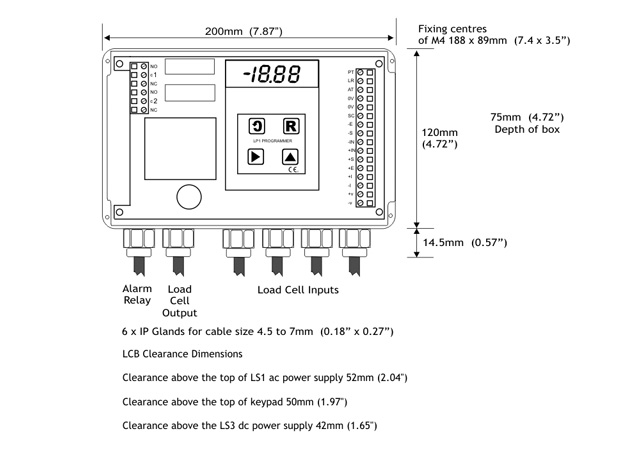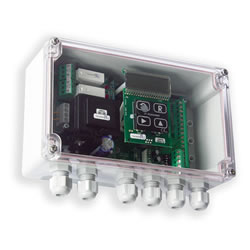LCA20 Load Cell Amplifier with Data and Relay outputs
- Measurement speeds of 10 / 80 samples per sec
- 5 V excitation supports up to 10 x 350 R load cells
- Sensitivity from 0.5 to 7.8 mV/V
- Full digital set–up using PC or keypad
- 3 x configurable digital inputs e.g. for auto tare, peak hold and reset
- Fully isolated 4-20 mA and 0-10 V analogue outputs
This very flexible digital load cell amplifier for weighing single or multiple load cell applications, offers an easy one-pass calibration and fast setup. It is also equipped with relays, data port and display.
The LCA20 load cell weight indicator offers options of local or remote LCD displays, isolated 4-20 mA 0-10 V analogue outputs, relay outputs for control or alarm functions, for example, in crane overhead alarms, and also for, in-flight compensation commonly used in silo bag filling applications. The RS232 or RS485 options provide for digital communications (including setup) and can support label or ticket printers.
Analogue and digital output, set point and display capabilities AC or DC powered, IP65 NEMA 4 protected.
IP65 bulkhead mounting ABS case - also available as a DIN rail or PCB module - model LCB-20
View LCA20 Video on YouTube to learn more.
Can be used in conjunction with our LCI load cell failure alarm, which is designed to continuously monitor the condition of individual load cells and activate an alarm when faults in the system are detected, therefore providing increased safety and cost savings onsite for all weighing systems.
| Inputs | |
|---|---|
| The input is of the Load Cell/Strain Gauge type. With transducer excitation voltage of 5 volts @ 160mA to drive 10 x 350R bridges | |
| Compensation by ± sense wires for cable and safety barrier losses down to 3V excitation | |
| Load cell sensitivity range 0.5 to 7.8mV/V (2 ranges configured from keypad or communications port) | |
| Initial offset is no greater than ± 0.15mV (15uV/V) which is cancelled during auto calibration | |
| Speed | 10 and 80 Samples Per Second (configured from keypad or communications port) |
| Factory mV/V calibration accuracy | ± 0.05% FSD being typical |
| Drift | ± 2 ppm per degree C @ 2.5 mV/V typical |
| Non Linearity before linearization | 10 pt typical |
| Internal Resolution | 20 bit or 1 part in 1,000,000 |
| Noise Free Resolution @ 10 Hz | 17.5 bit or 1 part in 180,000 |
| Contact inputs | are available for auto tare, print and peak hold reset and are volt free |
| Analogue Outputs | |
| Drive | 4-20 mA up to 1 Kohm and 0-10 volts up to 2 mA |
| Accuracy | ± 0.15% of range, typical |
| Resolution | as for display up to 13 bits / 4.5 digits. Settling time 350 mS to within 1% of step change |
| Isolation | ±130 V RMS or DC max to analogue input or any other port |
| Power Supplies | |
| LS1 | 110 V-120 V AC or 220 / 230 V AC 50-60 Hz 10 W |
| LS3 | 9-32 V DC 10 W isolated |
| Data Retention/Protection | |
| Retention | 20 years for set up values, minimum of 100,000 write cycles |
| Protection of data and function(s) | Watchdog timer giving repeat auto resets. Impending power detection and hold off. Calibration and Toolkit lock feature |
| Other Options & Accessories | |
| 2 Set Points | Output through 5 A 240 V AC SPCO Relays, with a latching option |
| Communications Port | For data transfer or print via :- |
| RS485 | Enabling up to 253 units to be multi dropped |
| RS232 | For 1 to 1 connection and standard printer drive and large displays |
| Printer Operation | By closure of volt free contact or continuous ASCII stream |
| Baud Rates | 2400, 4800, 9600, 19200, 38400, 57600, 76800, 115200 |
| Die Cast Case | Sealed to IP65 / NEMA 4 with external dimensions of 220 x 120 x 80mm max |
| Stainless Steel Case | Sealed to IP65 / NEMA 4 with external dimensions of 224 x 160 x 90mm |
| PCB Only (Eurocard) (LCB20) | 100 x 160 X 57mm for rack or customers enclosure |
| Environmental | |
| Storage Temperature | -20 to +70ºC |
| Operating Temperature | -10 to 50ºC |
| Relative Humidity | 95% maximum non condensing |
| CE Environmental Approvals | European EMC Directive 2004/108/EC, Low Voltage Directive 2006/95/EC |

Documents
- LCA20 Product Sheet : LCA20 & LCB Product Sheet
- LCA20 Manual : LCA20 Load Cell Amplifier with Relay & Data Output, LCB & Toolkit full descriptions
Software
- LC Toolkit : Version 1.8.0 The LC Toolkit software for Windows will allow a connection with the LCA20 via an optional on-board communications module LC4 or via an optional programming cable PGM1.
- Q: What Protocols are available with the LCA20?
-
A: There are 4 Protocols
CP=128 = Mantrabus 1 a hex based protocol. Most popular, easiest to deal with from programming point of view.
CP=131 = Mantrabus 2 updated version of Mantrabus1
CP=133 = Mantra ASCII 2 based protocol designed for old teletype machines, looks easier but actually more complicated to programme.
CP = 132 Modbus RTU used a lot in PLCs. 3rd Party S/W available. Hex based.
Or alternatively set CP=127 and the device will transmit an ASCII string every display update (used for continuous printout to either printer or display.
- Q: Does stainless steel case for LCA20 have stainless steel glands?
-
A: No plastic PG9 glands.
- Q: Does the 4-20 mA output on an LCA20 have galvanic separation?
-
A: No but it does have electrical isolation up to ±130V RMS
- Q: How do you view the live reading on the LCA20 without Auto Tare and having to calibrate again?
-
Go to the 'measurement' section in the LCA Toolkit.
Note the reading in the 'Tare' value box and then change the value to zero. Click on the 'Tare' button and the unit will display live reading.Alternatively, using the keypad:
Go into the menu and pick AT Mnemonic.
Note the reading down and then set to zero.
Press return and then the unit will display live reading.
To reset Auto Tare re enter value in AT Mnemonic screen which you noted down.
- Q: What is the maximum length of cable we could connect between a LCA20 unit and a load cell unit?
-
A: It would depend on many different factors:
The quality of the cable
The type of cable
Whether it was 4 or 6 core
The number of load cells
Environment
Interference
With the best quality of cable in an ideal environment and with little or no interference we have had operating at 200 metres.
- Q: LCA20 / SMW can they handle tension and compression?
-
A: Yes
- Q: Is it possible to connect two LCA20s to one load cell?
-
How would the scaling of each remain stable in the event of a failure of one or the other ?
Can the output of the load cell be connected to both LCAs? With perhaps a resistor network holding the input of the second to a reference ?A: This is done using 6 wire, with the second LCA20 as 5 wire (no "+" excitation).
You could have two 6 wire with two blocking diodes (for redundancy).
Or a separate power supply and two 5 wires.
- Q: How do I factory reset a ADP / ADW / LCA20 / SMW?
-
A: Hold down the Scroll and reset key and then power cycle the unit.
- Q: Can I use a laptop to set up the LCA20?
-
A: Yes, by means of the optional PGM1 Programming Cable and the LCA Toolkit. The option to use the LCA20 keypad is also available.

